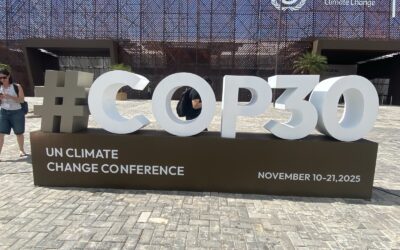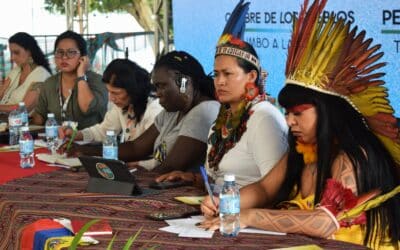Recently, the work of Global Forest Coalition was featured on an episode of Women Rising Radio called “Deforestation Emergency.” Interviews were done with Bernarda Pessoa of CONAMURI in Paraguay and Eva Cachaña of Trem Trem Mapu in Chile, as well as GFC’s executive director, Simone Lovera. They described the disproportionate impacts of extractivism and climate change on women and the repression of environmental and land defenders.
They also spoke about what they are doing to address these problems. In conversation with host Sandina Robbins, Simone Lovera explained GFC’s founding principle that “forests shouldn’t be separated from people” because “people for centuries and millennia have been shown to be perfectly capable of living in harmony with forests.” Meanwhile, Bernarda Pessoa recalled “My mom was a healer. They used to talk about the environment, about the trees, about those who inhabit the water and the earth… humans are harming the blessings that nature gives us.” And in Chile, Eva Cachaña explained, “we’re interested in protecting the native plants, because they’re medicine for our people and for people in general.”
You can listen here (starting at 12-minute mark) and read the full transcript below.
Host Sandina Robbins: The Natural Resources Defense Council estimates that 15% of the world’s trees are cut down to make toiled paper, and that as much as 50% of toilet paper used in the US comes from South America. At that rate, the US is literally flushing South America’s forests down the toilet. Simone Lovera, executive director of the Global Forest Coalition, explains how multinational corporations like Charmin’s parent company, Procter & Gamble, have been decimating South America’s natural resources and biodiversity. She speaks to us from her home in Paraguay.
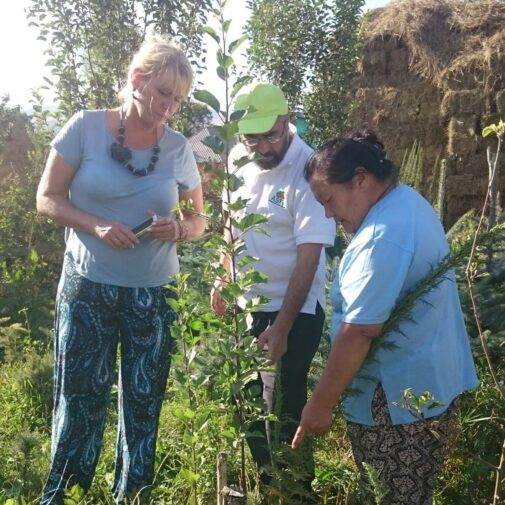
Simone Lovera (left) with colleagues in the field
Simone Lovera: They basically wanted to divide all the world’s forests into, on the one hand, monoculture tree plantations to produce timber, so you had enough wood supply, and on the other hand, very strictly protected areas where people could not enter either. And we were like, so where’s the place for people in this forest? And that thinking really brought forth the Global Forest Coalition. All these people together agreeing, this is ridiculous, we should have a coalition that really puts the rights of people first, that conserves forests by and for people. You know, forests shouldn’t be separated from people. People for centuries and millennia have been shown to be perfectly capable of living in harmony with forests.
So, the story about tree plantations is a very cynical one. Because actually the tree plantations in many countries and especially here in Paraguay are financed by climate funds [like] the Green Climate Fund, which is supposed to be the biggest climate fund in the world. And they have been funding some of the biggest monoculture tree plantation projects here in the country. And so, it’s direct deforestation caused by the expansion of tree plantations, and especially destruction of grasslands and other beautiful ecosystems, by these tree plantations. But it’s also the lack of opportunity to regenerate this continent, to restore this continent, that is being destroyed by these monoculture tree plantations and by this while idea that any tree planting is good.
Companies like Shell and French Total, are investing up to 100 million dollars a year in these so-called nature-based solutions. And nature-based solutions are solutions for business using nature. If you look at what is the most profitable projects for these businesses to invest in, it’s sadly monoculture tree plantations. For the people, tree plantations don’t deliver anything. They deliver a couple of jobs, but only temporary. So people lose their lands, they lose their jobs, and they don’t get anything in return. And you just see the depopulation of whole villages that have to leave because there are more and more of these areas that are green deserts. There’s no life, there’s no biodiversity, there’s no jobs. It particularly hits women hard because women very much depend on infrastructure like small shops, like schools for their children, like health centers. And sadly, the Glasgow Conference has been extremely negative in this respect, because they made this declaration that they would stop deforestation by 2030. And this is really pathetic, because in 2015, all the heads of state came together to reaffirm the Sustainable Development Goals. In those goals, there is a target that deforestation will be halted by 2020. That’s ten years earlier than 2030. And it’s devastating. Here in the Chaco, if you have eight more years of deforestation, the Chaco is gone. There’s no way you can save South America if you have eight more years of deforestation. The Amazon will be gone, it will become all a big savannah, the Chaco will just burn up.
Sandina Robbins: South America’s Gran Chaco is 250,000 square miles of forested plains, second only to the Amazon in size. The name comes from the Quechua word chacu, or hunting lands, as it’s known for its abundance of diverse plants and animals. But rampant deforestation is threatening the Chaco, which is shared by Paraguay, Bolivia, Argentina and Brazil. And as Simone Lovera reports, Indigenous people of the Chaco are on the front lines of habitat, culture and climate destruction.
Simone Lovera: It’s always been very hot in the summer in Paraguay and very humid, and very difficult. But now the heat wave, and especially the drought, has really affected the entire country. And here you see that sadly, the Indigenous peoples are the most affected. I mean, they don’t have any water. People are dying of thirst. And the first who will suffer are those who don’t have an alternative source of water. And not to think about all the small farmers that are losing their crops. The big agricultural producers are also in big losses now for agricultural crops, but who are suffering most are the small peasants who don’t have any alternative, and especially like women, who often don’t have any savings so they can’t keep up if the lose the last bit of food they have.
So it has been absolutely devastating. And that is why the Indigenous are putting up resistance. We have for example the Qom community where there is a huge struggle to prevent monocultures from taking over their lands. In this Qom community, where there is particularly this one female indigenous leader that really stood up against these big monoculture tree plantation companies.
And it’s just amazing how much repression she gets. She has even gotten beaten up at a certain moment. She’s all alone there in the countryside. All her allies try and support her, but they’re here in the city and she’s there. It’s very hard. But, you know, she continues. And it’s so hopeful to see these heroes on the ground that really say, I don’t allow my community to be destroyed by this.
Sandina Robbins: Women Rising Radio spoke with that courageous Indigenous leader, Bernarda Pessoa Torres. She told us about her resistance to government and private companies taking over her community’s ancestral lands to make room for non-native trees, cattle, and crops for export. Bernarda is part of CONAMURI, a coalition of rural and Indigenous women fighting to protect their environmental, territorial, and human rights in Paraguay’s Chaco region.
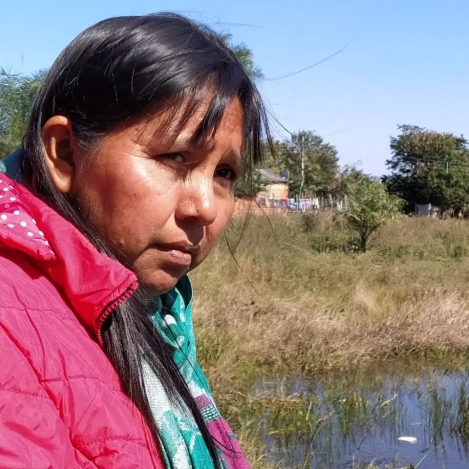
Bernarda Pessoa in rural Paraguay
Bernarda Pessoa: When my ancestors were alive, they were believers of the Qom culture. My mom was a healer. They used to talk about the environment, about the trees, about those who inhabit the water and the earth. We’ve found that humanity is harming our natural resources because the natural resources are there to serve us, but humans are harming the blessings that nature gives us.
The Chaco region has always had problems with drought and flood, always. But in previous decades, they were not as destructive as they are now because too many trees are being cut down today. When it rains, the whole area floods. There are no dry areas left where people can settle. And during the drought period, there used to be ponds up in the jungle, they were always there. But not anymore. They have all dried up completely because in the Chaco region, there are many industries. The extensive cattle ranching, the selling of trees that are turned into poles and pulp, and others that were turned into charcoal. And soy and rice farms. Deforestation has increased a lot. Children have become malnourished, pregnant women are not eating well. So their babies are born sick. There’s no work, there’s only work under labor exploitation, only a few ranchers will pay.
Now we’re in a food crisis, and a drought crisis. And the government said they signed an emergency decree so that producers can recover the products they’ve lost to the drought. But that does not reach Indigenous communities. What do corporations do? They really take advantage of the poverty. Then they force the Indigenous communities out. The evictions are very violent. They have displaced the houses of prayers, they knock them down with tractors, the school has been demolished. It’s a human rights violation that they’ve committed.
Meanwhile, the government says that we have corporations to bring hope for the development of Paraguay. Indigenous people become beggars in Asuncion, the capital. The women, the girls become sexual objects. These are violations that they suffer. Some commit suicide because they can no longer bear the situation. It directly affects women, girls, and boys. And no one is talking about this. This is the abuse we’re suffering in the Gran Chaco in Paraguay, we who live in the territory now.
Sandina Robbins: Bernarda has organized roadblocks leading into Qom territory, calling on the Paraguayan government to respect and protect their lands. She tried collaborating with non-profits like the Paraguay Foundation but found that they were enabling corporations to bring invasive species like genetically modified eucalyptus trees and poisonous pesticides into the Chaco. Bernarda has faced police repression and a knife attack. Left bleeding, she was even refused treatment at her local clinic. The persecution continues as Bernarda’s son was falsely accused of murder and kept in prison for two years. But Bernarda refuses to give up, saying she’ll continue to fight for the survival of her land, her people and her culture.
Bernarda Pessoa: We went to make a complaint many times, but they designated a judge specifically for Indigenous people and that judge is hired by the corporations, so my formal complaint ended in nothing. On the international level, we made a complaint through Amnesty International. We also managed to make an appeal through the Women’s Collective of Gran Chaco, and now I’m making one through you, too.
Sandina Robbins: In Chile, Colectivo VientoSur, or Southern Winds Collective, organizes against deforestation and in favor of territorial rights. Camila Romero does work with the collective in collaboration with women in rural and Indigenous communities. Eva Cachaña, a native Mapuche activist, is her pu lamngen, an Indigenous word for sister in struggle. Together, Eva and Camila are committed to stopping the pulp mills that are ravaging the forests in Mapuche territory. Eva tells us why she’s in the fight.
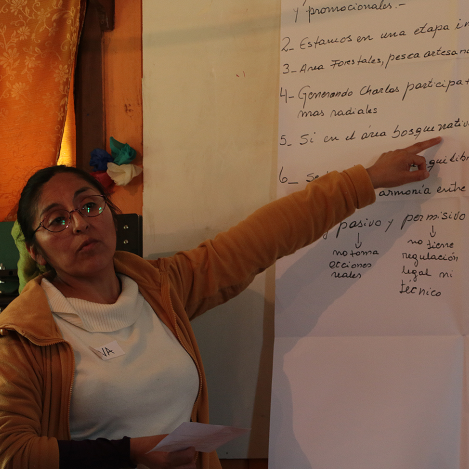
Eva Cachaña at a workshop with Colectivo VientoSur in Chile
Eva Cachaña: About 20 years ago, I became part of an Indigenous association called Trem Trem Mapu to strengthen the cultural identity as well as the social, economic and environmental status of our people and our community. I’ve been working with the health program for Indigenous peoples in which we work with ancestral medicine. We’ve treated many Mapuche and non-Mapuche people. And for that reason, we’re interested in protecting the native plants, because they’re medicine for our people and for people in general.
In spite of the fact that our region has a lot of water, the freshwater is drying up because they’re constantly replacing the native plants with eucalyptus and pine plantations. We don’t receive any benefits or see any progress from these plantations for people with lower means. We don’t have roads or means of transportation, there are no schools there, the schools have been shut down.
And another thing is that thyroid gland illnesses are increasing a lot now that the cellulose company Arauco is here. We live very close to the industrial plant, and there is definitely a problem with radiation for the workers inside the company. We have acid rain over the fruit trees and the vegetable gardens, and finally, all the profits that are made are going to other hands. The people continue to be poor all the same.
Sandina Robbins: Camila describes how corporations use Indigenous communities as “sacrifice zones” to extract their natural resources and pay govt officials to look the other way.
Eva Cachaña: These companies are created for extraction. They seize a large portion of the territory, they replace the native vegetation, the native forests, and in their place, they plant exotic trees that are not from here and that grow very quickly. This way, the forest activity becomes exploitation, degradation of the forest and of the people […]
These are policies that allow the pillaging and capitalist accumulation that benefit some and impoverish others, so in Chile there are sacrifice zones that are abandoned by the government. And of course, it’s a form of discrimination against the people. I feel that it goes hand in hand with colonization as well, because it even has a Christian tone, when saying that someone has to sacrifice themselves, which is typical of the capitalist system that consumes the land and the bodies of the people. We have the industry of wood chips, and the industry of cellulose derived from wood. Mainly from pine and eucalyptus, so both the cellulose and the wood chips are sent abroad. They’re mainly sent to China. Tons of chips and cellulose mass are exported to the Asian market.
Also, in these areas, it’s known that there’s a lot of political persecution, especially toward the people who expose the reality, who point out the problems and denounce the companies. Many social leaders have been persecuted, even murdered. In these zones, there’s a high level of police repression and militarization, too. This is very alive. It’s happening all the time. There’s a constant struggle with the police in Mapuche territory.
Sandina Robbins: The Global Forest Coalition is calling for an international solidarity movement in support of the Chaco and other remaining old growth forests around the world. They’re also raising awareness about the role that animal agriculture plays in deforestation, with more and more forestlands being cleared to raise cattle. GFC’s Simone Lovera urges everyone to stop or reduce eating meat to protect our forests and the future of the planet.
Simone Lovera: I know it’s often so like… the solutions can come from the UN and climate change is a global problem, you know, what can I do myself? Deforestation is such a problem. What can I do myself? Reduce your meat and dairy consumption as much as possible. Also, for climate change, because especially beef production is associated with very heavy methane emissions. The other thing is flying, including private flights which are a total scandal. Reducing your flights is another vey big step a lot of people can take.
Visit Women Rising Radio to hear these interviews and more.


